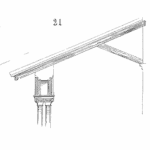
Some time ago, earlier in my career, I worked for a wonderful boss. She would stop by my office on occasion and ask ‘what’s new?’ or “how’s it going?’ Just a check-in. I often let her know about the current vexing problem I was struggling with at the moment.
The funny thing is she never directly solve the problem for me. She certainly could have. Instead, she would ask a couple of questions that always helped me to find the solution. This happened with problems concerning dealing with a difficult person, strange material properties, motivating change within a group, or finding someone that could design and run a computational fluid dynamic model for me.
It was her questions the helped. She did this in meetings, in presentations, and when she swung by my office for a chat.
An HBR Tip of the Day “Lead with Questions, Not Answers”
A recent Harvard Business Review Tip of the Day recommended that as a leader it is often a great practice to lead with a question. The tip reinforced the idea that the right questions are a sign of vulnerability that works to improve trust.
Asking big open-ended questions to set a frame of thinking could “inspire a burst of collaboration and creativity across the organization.”
The key in asking questions is not to put someone on the spot rather assist one view the world just a bit differently. My boss did this regularly – she helped me reframe how I viewed a problem with just a question or two. She also inspired our team to work closely together to innovate and solve really challenging problems.
As a leader, and all of us are leaders, by using a ‘question-first mindset’ we nudge our organization toward being a place where all of our questions get better. Where we can be curious because that is what we do. A place where we are all expected to learn on a regular basis.
Questions and Reliability
In the conduct of failure analysis, it is common to ask why? Why did this occur? We may even use the tool named ‘5 Whys’. The intent is to determine and understand the root cause behind a particular failure.
In the setting of a reliability goal, we may ask about customer expectations, about the day in the life of the product, and maybe even a few ‘what if’ questions as we flush out the expected environmental and use stresses.
When just starting on a new project, my first two questions are:
- How reliable does this product have to be and for how long?
- What is the cost of failure?
Some other common questions include:
- Which vendor’s part is more reliable in our situation?
- What is likely to fail?
- How many times might a customer drop this handset?
- What tradeoffs are we making concerning reliability performance?
- What happens if this part is kept cool?
And, more, we are natural question-askers or should be.
Questions to Help Others
What is important? What other factors cannot be compromised too far? Have you considered how this impacts a customer trying to use the device?
I wish I had my boss on speed dial, as I would ask her for examples of questions she asked that made a difference for someone.
From my perspective, is asking the question that allows the other to consider the world from a new angle allows them to view a problem just a little differently. For example, if entering a building looking for a specific conference room, looking at room numbers or names is one approach that eventually will work. Yet, if I took a quick look at a room map, I could find the conference room quickly.
Sometimes the question exposes just the right search phrase. For example, when working on a problem involving polymer degradation, a colleague asked if I considered the effects of chain scissions due to oxidation? It was something I had never heard of before and investigated.
Sometimes the question helps get a person close to possible solutions. For example, in brainstorming, you may have experienced anchoring. That is when the facilitator during the brainstorm mentions, ‘how about when it’s raining?’ or ‘what about customer abuse situations?’ This tends to focus the groups thinking around the area mentions. As a reliability engineer, we ask questions concerning the reliability objective that may focus on customer expectations and/or on product line profitability. In each case, we bring focus onto the desired product reliability performance from different vantages.
One great thing about asking questions is we can set the tone that we and anyone need to know everything all the time. We can, and should, ask questions. We can, and should, continue to learn and assist others to learn, as well.
Practice asking questions. Set a reminder for yourself to ask first, then learn rather than dictate solutions and then defend. Ask questions such that others want you to swing by for a visit so they can hear your questions.
The HPR tip and inspiration for this article is based on “Good Leadership Is About Asking Good Questions,” by John Hagel III
 Ask a question or send along a comment.
Please login to view and use the contact form.
Ask a question or send along a comment.
Please login to view and use the contact form.
Leave a Reply